|
|
|
Sort Order |
|
|
|
Items / Page
|
|
|
|
|
|
|
| Srl | Item |
| 1 |
ID:
169686
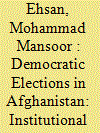

|
|
|
| 2 |
ID:
093940
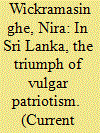

|
|
|
|
|
| Publication |
2010.
|
| Summary/Abstract |
Rajapaksa's patriotism merges nation and state, and it promotes a love of country based on a particular reading of the Sinhalese people's foundation myth, a reading in which all other groups . . . are present only as shadows.
|
|
|
|
|
|
|
|
|
|
|
|
|
|
|
|
| 3 |
ID:
128144


|
|
|
|
|
| Publication |
2014.
|
| Summary/Abstract |
This paper attempt to offer insights into the complexity of what can be broadly termed as the South African Indian (SAI) identity through a study of their unique historical trajectory and experiences in the context of the apartheid era, that began in 1948, and the post apartheid phase. Since the dismantlement of the racist regime and first democratic elections in 1994, the SAI community is at across road.
|
|
|
|
|
|
|
|
|
|
|
|
|
|
|
|
| 4 |
ID:
131498
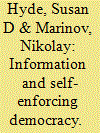

|
|
|
|
|
| Publication |
2014.
|
| Summary/Abstract |
This article argues that when democracy is not yet institutionalized, leaders have little incentive to push for clean elections, in part because they are likely to face accusations of fraud from domestic opposition groups regardless of their true behavior. Reputable international election observers can facilitate self-enforcing democracy by providing credible information about the quality of elections, thus increasing citizens' ability to coordinate against the regime when election fraud occurs, and discrediting "sore loser" protests. Patterns of postelection protests are consistent with the argument, including that postelection protests are more likely and last longer following negative reports from international observers. International election observers help promote democracy by making postelection protest more accurate in the short term, thereby increasing incentives for leaders to hold democratic elections in the long term.
|
|
|
|
|
|
|
|
|
|
|
|
|
|
|
|
| 5 |
ID:
120752


|
|
|
|
|
| Publication |
2013.
|
| Summary/Abstract |
Leaders are influential in Turkish politics; since early Republican years under Atatürk and Inönü, the dominance of omnipotent leaders continued, if not escalated, under democratic elections. Menderes or Demirel or Erbakan, and presently Erdogan, each leader assumed office with different personal and political backgrounds, worldviews, and personality characteristics. Nonetheless, a systematic study of political leaders in Turkish politics and foreign policy has rarely been a concern to scholars of Turkey. This lack of attention to Turkey's political leaders affects not only a nuanced understanding of its domestic politics but also its foreign policy. How do Turkish leaders' idiosyncratic traits affect their politics? How does the common phrase "secular and religious leaders" capture differences among Turkey's leadership? Utilizing a method of leadership assessment at-a-distance, this piece provides answers to such questions with respect to foreign policy profiles of all post-Cold War prime ministers of Turkey. It illustrates that Turkish leaders have distinct leadership traits but cannot be reduced to "seculars" and "Islamists."
|
|
|
|
|
|
|
|
|
|
|
|
|
|
|
|
| 6 |
ID:
119513
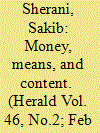

|
|
|
| 7 |
ID:
103307


|
|
|
|
|
| Publication |
2011.
|
| Summary/Abstract |
In democratic elections, candidates and parties promise to deliver public goods to segments of the electorate to win their support at the polls. In new democracies, especially in rural agrarian societies, existing networks of clientelist politics can alter this logic, so that candidates instead promise private goods to patrons in return for those rural patrons delivering the votes of their clients. This suggests that in such regimes, the distribution of public goods spending by the government should vary inversely with the strength of clientelist networks. Specifically, we propose that the strength of patron-client ties varies according to whether peasants farm as smallholders, sharecroppers, fixed rent tenants, or landless laborers. Accordingly, the strength of rural patrons should vary across districts with the distribution of households among various land tenure categories. Our theory then suggests that where land tenure patterns render rural patrons weaker, elected governments should invest more resources in public goods to win the votes of peasants. Where land tenure patterns give patrons more control over peasant farmers, government spending on public goods should be lower because candidates and parties have to devote more resources to private benefits to the patrons. We test this proposition with district-level data from Nepal on the patterns of land tenure and on the provision of public goods.
|
|
|
|
|
|
|
|
|
|
|
|
|
|
|
|
| 8 |
ID:
135579
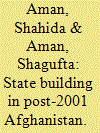

|
|
|
|
|
| Summary/Abstract |
The post-cold war international environment has become conspicuous for a changed appreciation of the concept of state sovereignty. under the new concept of sovereignty as responsibility’, the failure of a state to enforce its coercive authority over its territory, and inability, either to deliver services or protect the population from violence, was justified as a reason strong enough for international community to intervene for rebuilding the so-called failed states.
|
|
|
|
|
|
|
|
|
|
|
|
|
|
|
|
| 9 |
ID:
127609
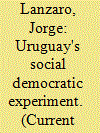

|
|
|
|
|
| Publication |
2014.
|
| Summary/Abstract |
At the dawn of the twenty-first century, a historic change took place in Latin America. Through democratic elections, left-leaning governments were established in a large group of countries (Argentina, Bolivia, Brazil, Chile, Ecuador, El Salvador, Nicaragua, Paraguay, Peru, Venezuela, and Uruguay). Even
if this turn to the left has the nature of a "wave," the governments that are part of it show a marked diversity. Among them, the new populists (Venezuela, Bolivia, Ecuador) stand out, as well as the Kirchners (Néstor and then his widow, Cristina), in Argentina, who offered a progressive version of the versatile Peronist movement. These governments have their peculiarities, no doubt, but they are rooted in the old trunk of populism, which has been a recurrent political phenomenon in Latin America during different historical stages and with different ideological leanings, from left to right.
|
|
|
|
|
|
|
|
|
|
|
|
|
|
|
|
|
|
|
|
|